Learn about Cleopatra, the last of the ancient Egyptian pharaohs.
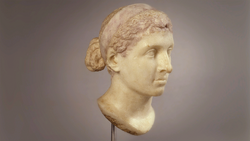
Head of Cleopatra VII (69-30 BCE) / 1st century BCE
Cleopatra VII Thea Philopator ascended the throne in 51 BCE, at the age of eighteen. Though her early attempts to maintain power were often challenged, she eventually prevailed, and became the sole ruler of Egypt.
According to Plutarch, she was the only Ptolemaic pharaoh to speak the Egyptian language. Her intelligence, coupled with a good education and a great political mind, allowed her to make the alliances necessary to maintain the independence of Egypt while Rome was becoming a Mediterranean empire.
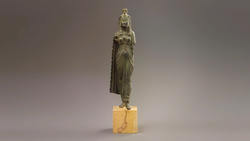
(Probably) Cleopatra VII / Greco-Roman Era
It is important to understand that Cleopatra's knowledge of Egyptian language and keen understanding of Egyptian language and keen understanding of the culture allowed her to make powerful ideological referents that resonated with ancient Egyptians.
By associating herself with the goddess Iset, the divine mother, great of magic and repository of divine essence, Cleopatra firmly established herself as the Protector of the Two Lands, and legitimized her place on the throne.

Mint: Tetradrachm of Ptolemy XIII / Ptolemaic Era
Upon his death in 51 BCE, Ptolemy XII Aulos bequeathed his kingdom to his daughter and eldest son: Cleopatra VII and Ptolemy XIII.
As was custom, the siblings were married. The new pharaoh was 10 years old, his sister-wife 17.
The early years of their reign were not easy. Between 50 and 48 BCE, droughts and floods aggravated Egypt's problems. General Achillas and the royal advisor Potheinos kept intervening in the young rulers' political decisions, and eventually colluded to turn Ptolemy XIII against Cleopatra.
By 48 BCE, Cleopatra was in exile.
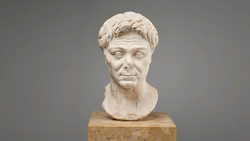
Pompey / Roman Empire Era
During Cleopatra's exile, the Roman empire was not without its own internal conflict. Caesar and Pompey were at war with one another, and after his defeat in 48 BCE, Pompey fled to Alexandria in the hope of finding refuge.
This turned out to be an unwise decision. Listening to his advisors, Ptolemy XIII elected to have Pompey assassinated, his head kept as a gift in the hopes of acquiring Caesar's favor.
This gambit backfired. Instead of earning approval, the murder of a Roman greatly angered Caesar.

Caesar Returns Cleopatra to the Egyptian Throne
Cleopatra, aware of Caesar's anger against Ptolemy for the murder of Pompey, decided to take advantage of the situation.
She returned to Egypt in secret, hoping to establish an alliance with one of the most powerful men of the time.
Outside of the legend where she had herself smuggled into his quarters in a carpet, what exactly happened during that fateful meeting remains a mystery. However, Caesar seemed to see a better ruler for Egypt in Cleopatra than in her young and too-easily influenced brother.
Invoking Ptolemy XII's will, Caesar attempted to mediate peace between the siblings.
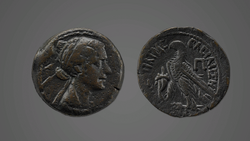
Coin; Ruler: Cleopatra the Great / Reign of Cleopatra
Ptolemy XIII was enraged by the turn of events, and his advisors were none too happy to see Cleopatra return. Urged on by General Achillas and Potheinos, the young Pharaoh plotted against Caesar and Cleopatra, resulting in the siege of Alexandria in 47 BCE.
It was in March 47 BCE that Caesar defeated Ptolemy XIII's forces. The young pharaoh drowned in the Nile after having fled the battlefield.
With her opponents dead or powerless, Cleopatra married her other much younger brother, Ptolemy XIV, and finally claimed the throne of Egypt for good.
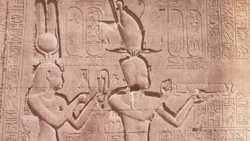
Denderah, Tentyris - Temple of Athor... Cleopatra & Caesarion / circa 1851
In June of 47 BCE, Cleopatra gave birth to a son, whom she called Caesarion. Caesar did not accept the boy as his heir, choosing instead his nephew, Octavian.
Nonetheless, on his return to Rome, Caesar invited the queen and her brother-husband to stay in the city. Her presence still drew much disapproval from the senate.
Always a strategist, Caesar left four legions in Egypt, and a man he trusted to direct Egyptian affairs, giving him control of the wheat supplies essential to Rome.
Cleopatra and her entourage remained in Rome until March 44 BCE, when Caesar was murdered.

Mark Antony at Cleopatra's Feast / Modern era
Caesar's most faithful ally, Mark Antony, often visited the queen of Egypt during his stay in Rome. Unlike most, he recognized the legitimacy of Caesarion, the natural son of Caesar.
Antony knew he would need the riches of Egypt, in order to fight OCtavian and claim the Roman Empire.
Cleopatra, in return, saw a powerful ally. In the winter of 41 BCE, she arranged a sumptuous tour of Egypt by boat, to show Antony the wealth of her country and the power she held as its ruler.
A romantic and political relationship followed. The Roman senate was once again most displeased. To calm spirits in Rome, Antony married Octavia, sister of Octavian.
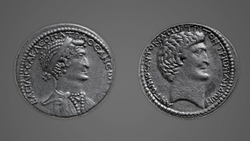
Tetradrachm; Portrait of Queen Cleopatra VII (& Mark Antony) / Reign of Cleopatra
Despite his marriage to Octavia, Antony remained Cleopatra's lover, and she gave birth to their children.
Cleopatra increased her kingdom's territory, and started a political propaganda alongside her lover, in Egypt and beyond. She hoped to create a Ptolemaic federal empire, with Alexandria at its center.
Antony eventually repudiated his Roman wife for the Egyptian queen, much to the dismay of the Roman elite.
However, while Mark Antony focused on Egypt, Octavian carefully gained military and political ascendency over him in Rome.
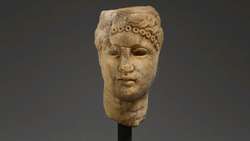
(Probably) Head of Cleopatra VII / Ptolemaic Era
Octavian managed his own propaganda campaign, and succeeded. The Roman people hated Mark Antony and Cleopatra. To avoid the censure still inherent in attacking a fellow Roman, Octavian simply declared war against Egypt.
Rome's power still reigned supreme. The powerful Egyptian fleet, led by Cleopatra as well as Mark Antony's forces, were defeated in 31 BCE in Actium.
Octavian arrived in Egypt in 30 BCE, to formalize his victory.

Death of Cleopatra, by Louis-Marie Baader
The following events remain difficult to confirm, due to the many versions and legends around them.
It is believed that after hearing a rumur about Cleopatra's suicide, Mark Antony commited suicide himself. He was brought to the queen, as he slowly passed away.
Knowing that Octavian would have her chained and paraded through Rome in defeat, Cleopatra planned her own suicide.
She most likely killed herself with arsenic, though admittedly the version where she uses an asp to deliver a fatal bite may be considered more dramatic.
What happened to the body of Cleopatra is still a mystery...
